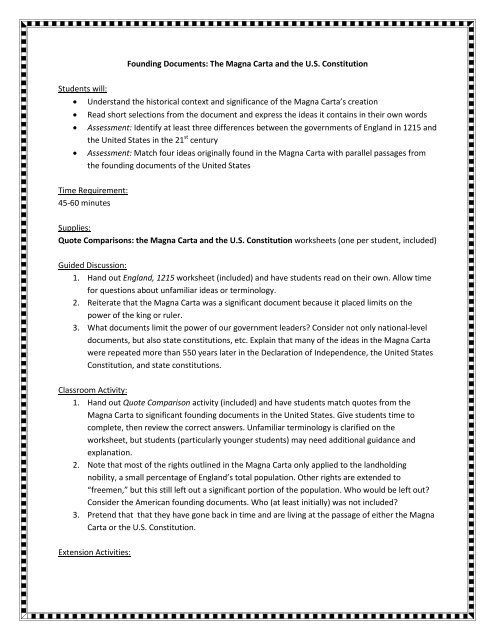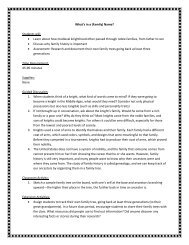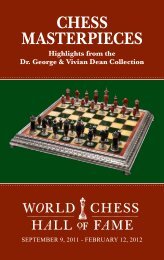Founding Documents: The Magna Carta and the U.S. Constitution ...
Founding Documents: The Magna Carta and the U.S. Constitution ...
Founding Documents: The Magna Carta and the U.S. Constitution ...
You also want an ePaper? Increase the reach of your titles
YUMPU automatically turns print PDFs into web optimized ePapers that Google loves.
Students will:<br />
<strong>Founding</strong> <strong>Documents</strong>: <strong>The</strong> <strong>Magna</strong> <strong>Carta</strong> <strong>and</strong> <strong>the</strong> U.S. <strong>Constitution</strong><br />
• Underst<strong>and</strong> <strong>the</strong> historical context <strong>and</strong> significance of <strong>the</strong> <strong>Magna</strong> <strong>Carta</strong>’s creation<br />
• Read short selections from <strong>the</strong> document <strong>and</strong> express <strong>the</strong> ideas it contains in <strong>the</strong>ir own words<br />
• Assessment: Identify at least three differences between <strong>the</strong> governments of Engl<strong>and</strong> in 1215 <strong>and</strong><br />
<strong>the</strong> United States in <strong>the</strong> 21 st century<br />
• Assessment: Match four ideas originally found in <strong>the</strong> <strong>Magna</strong> <strong>Carta</strong> with parallel passages from<br />
<strong>the</strong> founding documents of <strong>the</strong> United States<br />
Time Requirement:<br />
45-60 minutes<br />
Supplies:<br />
Quote Comparisons: <strong>the</strong> <strong>Magna</strong> <strong>Carta</strong> <strong>and</strong> <strong>the</strong> U.S. <strong>Constitution</strong> worksheets (one per student, included)<br />
Guided Discussion:<br />
1. H<strong>and</strong> out Engl<strong>and</strong>, 1215 worksheet (included) <strong>and</strong> have students read on <strong>the</strong>ir own. Allow time<br />
for questions about unfamiliar ideas or terminology.<br />
2. Reiterate that <strong>the</strong> <strong>Magna</strong> <strong>Carta</strong> was a significant document because it placed limits on <strong>the</strong><br />
power of <strong>the</strong> king or ruler.<br />
3. What documents limit <strong>the</strong> power of our government leaders? Consider not only national-level<br />
documents, but also state constitutions, etc. Explain that many of <strong>the</strong> ideas in <strong>the</strong> <strong>Magna</strong> <strong>Carta</strong><br />
were repeated more than 550 years later in <strong>the</strong> Declaration of Independence, <strong>the</strong> United States<br />
<strong>Constitution</strong>, <strong>and</strong> state constitutions.<br />
Classroom Activity:<br />
1. H<strong>and</strong> out Quote Comparison activity (included) <strong>and</strong> have students match quotes from <strong>the</strong><br />
<strong>Magna</strong> <strong>Carta</strong> to significant founding documents in <strong>the</strong> United States. Give students time to<br />
complete, <strong>the</strong>n review <strong>the</strong> correct answers. Unfamiliar terminology is clarified on <strong>the</strong><br />
worksheet, but students (particularly younger students) may need additional guidance <strong>and</strong><br />
explanation.<br />
2. Note that most of <strong>the</strong> rights outlined in <strong>the</strong> <strong>Magna</strong> <strong>Carta</strong> only applied to <strong>the</strong> l<strong>and</strong>holding<br />
nobility, a small percentage of Engl<strong>and</strong>’s total population. O<strong>the</strong>r rights are extended to<br />
“freemen,” but this still left out a significant portion of <strong>the</strong> population. Who would be left out?<br />
Consider <strong>the</strong> American founding documents. Who (at least initially) was not included?<br />
3. Pretend that that <strong>the</strong>y have gone back in time <strong>and</strong> are living at <strong>the</strong> passage of ei<strong>the</strong>r <strong>the</strong> <strong>Magna</strong><br />
<strong>Carta</strong> or <strong>the</strong> U.S. <strong>Constitution</strong>.<br />
Extension Activities:
• Have students pretend <strong>the</strong>y have traveled back in time <strong>and</strong> are living at <strong>the</strong> passage of ei<strong>the</strong>r<br />
<strong>the</strong> <strong>Magna</strong> <strong>Carta</strong> or <strong>the</strong> U.S. <strong>Constitution</strong>. Ask <strong>the</strong>m to write a “letter to <strong>the</strong> editor” explaining<br />
what <strong>the</strong>y do <strong>and</strong>/or do not like about <strong>the</strong> document in question. Are <strong>the</strong>y generally in favor of<br />
it or not?<br />
• Choose ei<strong>the</strong>r <strong>the</strong> U.S. <strong>Constitution</strong> or <strong>the</strong> <strong>Magna</strong> <strong>Carta</strong> to study. Divide <strong>the</strong> class into two<br />
groups, one in favor of <strong>the</strong> document, <strong>the</strong> o<strong>the</strong>r opposed. Have students research why people,<br />
at <strong>the</strong> time, may have been for or against it. Consider <strong>the</strong> points of view of those who are in<br />
power, <strong>and</strong> those who are (or who are not) included. Have students campaign <strong>and</strong> stage a<br />
debate, <strong>the</strong>n vote. Were any minds changed?<br />
Missouri Grade Level Expectations (GLEs):<br />
Communication Arts - Reading<br />
1. Develop <strong>and</strong> apply skills <strong>and</strong> strategies to <strong>the</strong> reading process<br />
3. Develop <strong>and</strong> apply skills <strong>and</strong> strategies to comprehend, analyze <strong>and</strong> evaluate nonfiction from a<br />
variety of culture <strong>and</strong> times<br />
Communication Arts - Writing<br />
1. Apply a writing process in composing text<br />
2. Compose well-developed text (optional; for older students)<br />
Communication Arts – Listening <strong>and</strong> Speaking<br />
1. Develop <strong>and</strong> apply effective listening skills <strong>and</strong> strategies<br />
Social Studies<br />
1. Knowledge of <strong>the</strong> principles expressed in documents shaping constitutional democracy in <strong>the</strong><br />
United States<br />
2. Knowledge of principles <strong>and</strong> processes of governance systems<br />
3b. Knowledge of continuity <strong>and</strong> change in <strong>the</strong> history of <strong>the</strong> world<br />
6. Knowledge of relationships of <strong>the</strong> individual <strong>and</strong> groups to institutions <strong>and</strong> cultural traditions
Quote Comparisons: <strong>the</strong> <strong>Magna</strong> <strong>Carta</strong> <strong>and</strong> <strong>the</strong> U.S. <strong>Constitution</strong><br />
Engl<strong>and</strong>, 1215<br />
Under <strong>the</strong> reign of King John, Engl<strong>and</strong> is faced with high taxes, a series of unsuccessful wars, <strong>and</strong><br />
religious conflict with <strong>the</strong> Pope. Unhappy with <strong>the</strong> state of <strong>the</strong> country, a group of wealthy noblemen<br />
called barons rebel against <strong>the</strong> king. <strong>The</strong> king <strong>and</strong> barons battle throughout <strong>the</strong> first half of <strong>the</strong> year to<br />
determine who will gain <strong>the</strong> upper h<strong>and</strong>. Finally, in June 1215, after six months of fighting, <strong>the</strong> victorious<br />
nobles force King John to sign an agreement that will eventually become known as <strong>the</strong> <strong>Magna</strong> <strong>Carta</strong>, or<br />
“Great Charter” in Latin.<br />
<strong>The</strong> new document addresses many complaints that <strong>the</strong> barons have with <strong>the</strong> king. Before this time, <strong>the</strong><br />
king was thought to hold absolute power; however, <strong>the</strong> <strong>Magna</strong> <strong>Carta</strong> puts limits on royal power <strong>and</strong> lists<br />
<strong>the</strong> rights of <strong>the</strong> barons <strong>and</strong> of all free men.<br />
If you think this story sounds familiar, it probably is. Over 550 years later, a group of American colonists<br />
declared <strong>the</strong>ir independence from Great Britain when <strong>the</strong>y felt King George III was infringing on <strong>the</strong>ir<br />
rights. In fact, many of <strong>the</strong> ideas in <strong>the</strong> founding documents of American government—<strong>the</strong> Declaration<br />
of Independence, <strong>the</strong> U.S. <strong>Constitution</strong>, <strong>and</strong> state constitutions—were directly inspired by <strong>the</strong> principles<br />
laid out in <strong>the</strong> <strong>Magna</strong> <strong>Carta</strong>.<br />
Below are four quotes from <strong>the</strong> U.S. <strong>Constitution</strong> that are directly related to parts of <strong>the</strong> <strong>Magna</strong> <strong>Carta</strong>. On <strong>the</strong> table<br />
on <strong>the</strong> next page, match <strong>the</strong> quotes from <strong>the</strong> U.S. <strong>Constitution</strong> with <strong>the</strong> quotes from <strong>the</strong> <strong>Magna</strong> <strong>Carta</strong>. In <strong>the</strong> middle<br />
column, write each quote from <strong>the</strong> <strong>Magna</strong> <strong>Carta</strong> in your own words. A glossary is provided to help with unfamiliar<br />
terms.<br />
Article 1, Section 8: “<strong>The</strong> Congress shall have<br />
Power To lay <strong>and</strong> collect<br />
Taxes, Duties, Imposts <strong>and</strong> Excises, to pay <strong>the</strong><br />
Debts <strong>and</strong> provide for <strong>the</strong> common Defence <strong>and</strong><br />
general Welfare of <strong>the</strong> United States…”<br />
Amendment 5: “…nor shall private property be<br />
taken for public use, without just compensation.”<br />
Quotes from <strong>the</strong> U.S. <strong>Constitution</strong><br />
Article 2, Section 3: “<strong>The</strong> Trial of all Crimes, except<br />
in Cases of Impeachment, shall be by Jury.”<br />
Amendment 6: “In all criminal prosecutions, <strong>the</strong><br />
accused shall enjoy <strong>the</strong> right…to be confronted<br />
with <strong>the</strong> witnesses against him…”
Quote from <strong>the</strong> <strong>Magna</strong> <strong>Carta</strong> What does it mean? Related Quote from <strong>the</strong> U.S.<br />
<strong>Constitution</strong><br />
12. “No scutage nor aid…shall be<br />
imposed on our kingdom, unless by<br />
common counsel of our kingdom…”<br />
28. “No constable or o<strong>the</strong>r bailiff<br />
…shall take corn or o<strong>the</strong>r provisions<br />
from anyone without immediately<br />
tendering money …”<br />
38. “…no official shall place a man<br />
on trial upon his own unsupported<br />
statement, without producing<br />
credible witnesses to <strong>the</strong> truth of<br />
it.”<br />
39. “No freemen shall be taken or<br />
imprisoned…or exiled or in any way<br />
destroyed…except by <strong>the</strong> lawful<br />
judgment of his peers or by <strong>the</strong> law<br />
of <strong>the</strong> l<strong>and</strong>.”<br />
Glossary<br />
Aid: tax<br />
Compensation: repayment<br />
Counsel: agreement<br />
Credible: trustworthy or reliable<br />
“Duties, Imposts <strong>and</strong> Excises”: types of taxes<br />
Freemen: men who are not slaves or serfs<br />
Scutage: a type of tax<br />
Tendering: paying [<strong>the</strong> owner]






